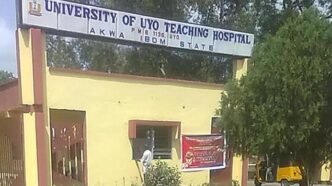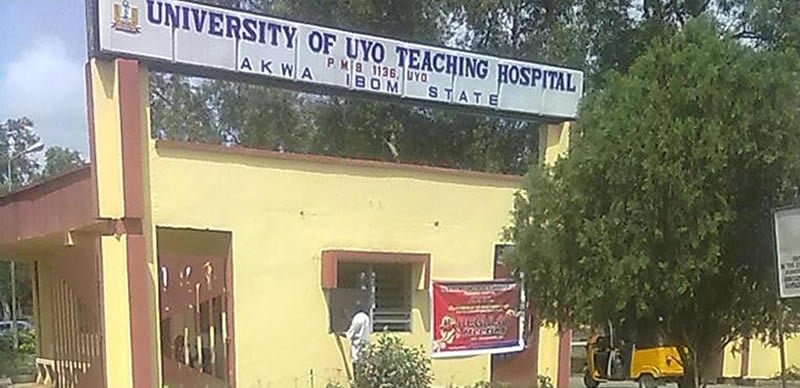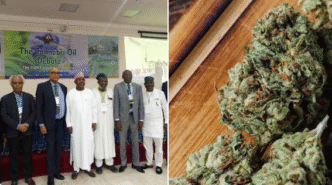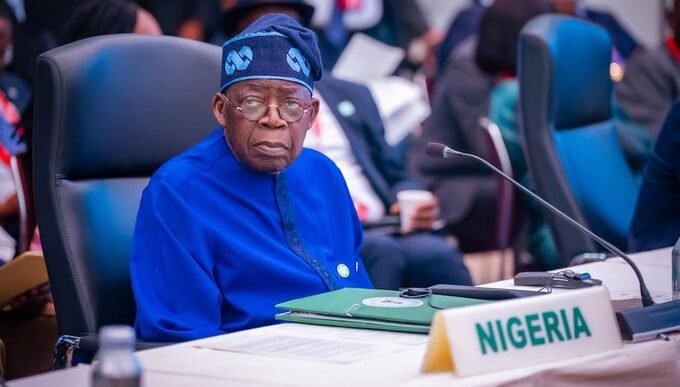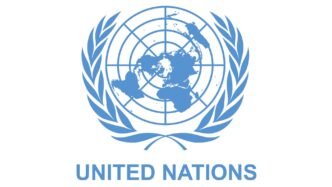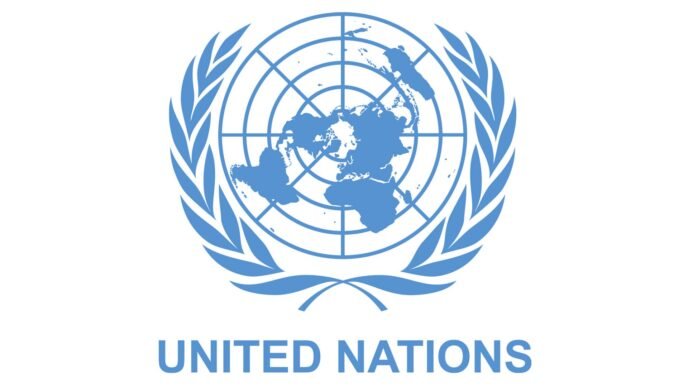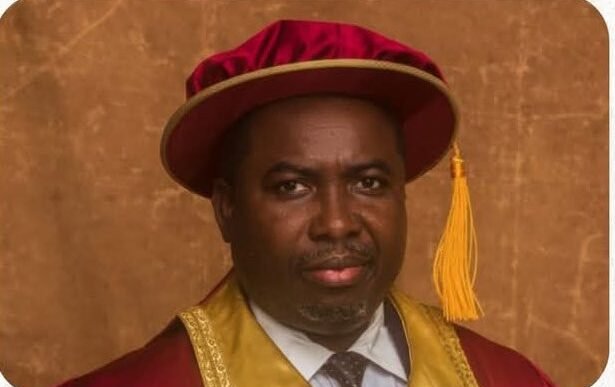Resident doctors at the University of Uyo Teaching Hospital (UUTH), Akwa Ibom State, have embarked on a seven-day warning strike to protest what they describe as persistent neglect of welfare, salary arrears, and poor working conditions by the hospital management.
The industrial action, which began on Monday, October 6, 2025, was declared after an emergency general meeting of the Association of Resident Doctors (ARD), UUTH chapter. In a communiqué issued after the meeting and made available to journalists in Uyo on Wednesday, the association said the strike became inevitable following repeated unfulfilled promises and lack of response from management to long-standing demands.
The communiqué, jointly signed by ARD President, Dr. Promise Jacob, and General Secretary, Dr. Enam-Eti Akpan, outlined several grievances, including delayed salary payments, failure to implement the correct Consolidated Medical Salary Structure (CONMESS) entry level, and unpaid arrears dating back to 2023.
Root Causes of the Industrial Action
According to the resident doctors, the management of UUTH has failed to address multiple welfare-related issues affecting its members despite several written and verbal appeals. The doctors said their patience had been stretched over time as promises of resolution were not met.
The key demands listed in the communiqué include:
- Implementation of the Correct CONMESS Entry Level: The association insists that newly employed resident doctors should be placed on the appropriate salary grade level, as prescribed by the federal government’s approved CONMESS scale.
- Reissuance of Appointment Letters: ARD demands that all newly recruited resident doctors should receive revised appointment letters reflecting the correct salary level and conditions of service.
- Payment of Outstanding Arrears: The association called for immediate payment of salary arrears and shortfalls owed to some of its members since 2023.
- Rectification of Biometric Capture Issues: Three resident doctors reportedly affected by failed biometric registration under the Integrated Payroll and Personnel Information System (IPPIS) should be paid through the Government Integrated Financial Management Information System (GIFMIS) pending correction on the IPPIS platform.
- Employment of Additional Resident Doctors: ARD stressed the urgent need for the recruitment of more resident doctors across departments to alleviate the manpower shortage and prevent burnout among existing staff.
- Improvement of Living and Working Conditions: The association also demanded immediate renovation and maintenance of the House Officers’ Quarters and call rooms, which they described as “deplorable and unsafe for occupancy.”
Resident Doctors Speak on Poor Welfare Conditions
Speaking to reporters in Uyo, ARD President, Dr. Jacob, expressed frustration over what he called management’s “indifference” to the plight of doctors. He said the association had explored every possible avenue for dialogue before resorting to industrial action.
“For over a year, we have written letters, held meetings, and made presentations to management regarding these issues, but all our efforts have been met with silence or promises that never materialize,” Dr. Jacob said. “Resident doctors are professionals committed to their duties, but we cannot continue to work under conditions that undermine our dignity and well-being.”
He explained that many members had been working under severe stress due to inadequate manpower, while those recently employed had not received their proper entitlements. “We are simply asking for fairness and the implementation of what is rightfully ours,” he added.
Hospital Management Yet to Respond
As of Wednesday evening, the management of the University of Uyo Teaching Hospital had not issued an official response to the strike. However, hospital sources confirmed that patient services, particularly outpatient clinics and elective surgeries, had been severely disrupted by the industrial action. Emergency and critical services are being handled by consultants and a few senior medical officers.
Attempts to reach UUTH’s Chief Medical Director (CMD), Professor Emem Abraham, were unsuccessful, as calls and messages were not returned at the time of filing this report.
A senior hospital official who spoke on condition of anonymity said management was “aware of the situation” and was working with the Federal Ministry of Health to resolve the grievances. “The issues raised by the doctors are not new,” the source said. “Efforts are ongoing to address some of them, but there are procedural and budgetary constraints that make immediate implementation difficult.”
Impact on Healthcare Services
The seven-day strike has already begun to affect healthcare delivery in the hospital, which serves as the primary tertiary health institution in Akwa Ibom State and caters to patients from neighboring states including Cross River, Abia, and Rivers.
At the hospital premises on Wednesday, patients were seen waiting in long queues, with some expressing frustration over the suspension of consultations and surgical procedures.
A patient, Mrs. Eno Udoh, who traveled from Oron for medical follow-up, lamented the situation: “They told me the doctors are on strike. I don’t know when they will resume, and I can’t afford to go to a private hospital. Government should please intervene.”
Hospital staff confirmed that only emergency units were partially operational, with skeletal services provided by consultants. Most wards and outpatient departments remained closed, while laboratory and radiology units recorded minimal activity.
Broader Context: A Recurring Crisis in Nigeria’s Health Sector
The strike at UUTH adds to the growing wave of industrial unrest in Nigeria’s healthcare system, as doctors and other health workers continue to protest poor welfare, unpaid salaries, and dilapidated working conditions.
In recent years, resident doctors across several teaching hospitals—including the University College Hospital (UCH) Ibadan, Lagos University Teaching Hospital (LUTH), and Ahmadu Bello University Teaching Hospital (ABUTH)—have embarked on strikes over similar issues.
Experts say these recurring strikes highlight the deep-rooted challenges of underfunding, bureaucratic inefficiency, and lack of political will to prioritize healthcare in Nigeria.
Nigeria’s healthcare system faces one of the lowest doctor-to-patient ratios in the world, estimated at one doctor per 5,000 patients, far below the World Health Organization’s recommended ratio of one doctor per 600 patients. Many hospitals are also grappling with outdated infrastructure, frequent power outages, and shortages of essential medical supplies.
Calls for Dialogue and Resolution
The Association of Resident Doctors, UUTH chapter, emphasized that the ongoing strike is a warning action meant to draw attention to their grievances, not to punish patients. The association stated that an emergency general meeting will be convened at the expiration of the seven-day period to review management’s response and determine whether to extend the strike or resume duties.
“We are open to dialogue at any time,” said General Secretary, Dr. Akpan. “All we ask is for management to act in good faith and address our legitimate concerns. Our members are under immense pressure, and morale is low. Without action, the quality of patient care will continue to decline.”
The doctors also appealed to the Akwa Ibom State Government and the Federal Ministry of Health to intervene swiftly to prevent a prolonged disruption in healthcare services.
Way Forward
Analysts believe that resolving the dispute requires genuine engagement between hospital management, the Federal Ministry of Health, and the resident doctors’ association. They argue that welfare-related issues in tertiary hospitals often stem from delayed government releases, poor administrative coordination, and lack of clarity in the implementation of federal salary structures.
Health sector observers also warn that continuous industrial actions could worsen the ongoing brain drain crisis, as more Nigerian doctors seek employment abroad in search of better pay and working conditions. According to the Nigerian Medical Association (NMA), over 15,000 doctors have left the country in the past five years, leaving hospitals understaffed and overstretched.
The UUTH strike, therefore, represents more than a localized protest—it reflects the systemic challenges confronting Nigeria’s healthcare system. Without a comprehensive reform of the health workforce and infrastructure, experts warn that the cycle of strikes, patient suffering, and workforce migration will persist.
Conclusion
The seven-day warning strike by resident doctors at the University of Uyo Teaching Hospital underscores the growing tension between healthcare workers and administrators over welfare, salaries, and working conditions. While the strike aims to press home demands for fairness and better conditions, its impact on patient care and hospital operations is already significant.
As the week progresses, all eyes will be on the hospital management and government authorities to see whether they will act swiftly to resolve the issues before the warning strike escalates into an indefinite industrial action.

